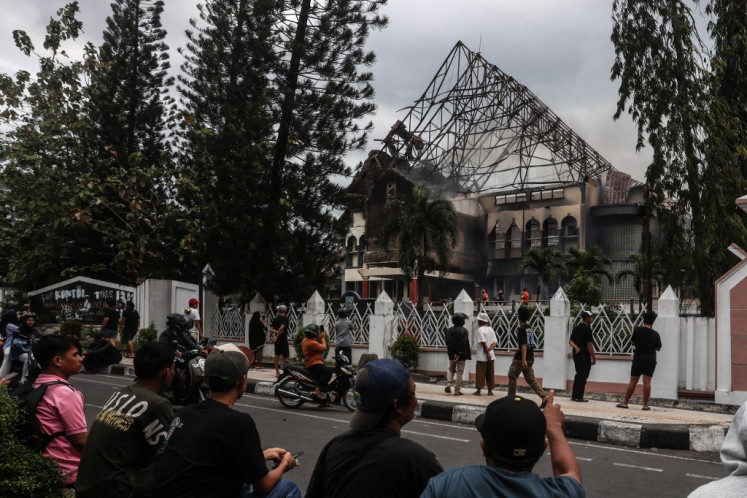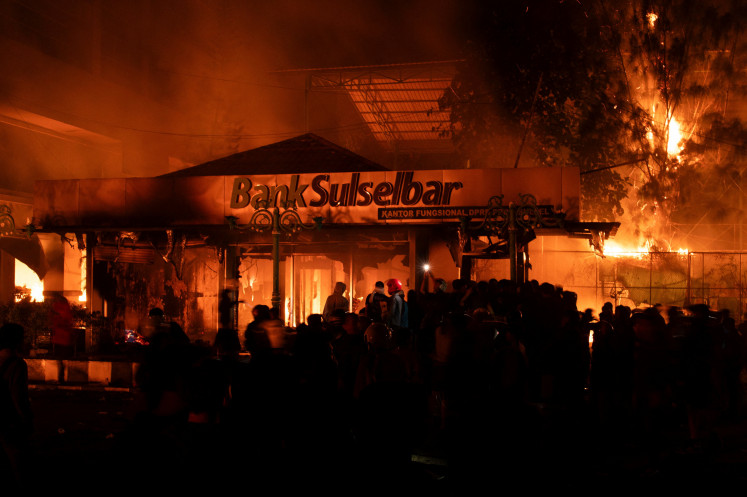Popular Reads
Top Results
Can't find what you're looking for?
View all search resultsPopular Reads
Top Results
Can't find what you're looking for?
View all search resultsIn Geneva, Indonesia promises more action on human rights
Gone too soon: Children observe the portraits of victims of human rights abuses on display by activists who staged their weekly silent protest across from the Presidential Office in Jakarta on Thursday
Change text size
Gift Premium Articles
to Anyone
G
span class="caption">Gone too soon: Children observe the portraits of victims of human rights abuses on display by activists who staged their weekly silent protest across from the Presidential Office in Jakarta on Thursday. It was their 274th protest aimed at pressuring the government to reconcile various human rights abuses. (Antara/Fanny Octavianus)
Following its move to reject some recommendations from the United Nations Human Rights Council (UNHRC), the Indonesian government made a face-saving gesture by offering to set up a long-awaited truth and reconciliation commission.
Speaking at the UNHRC’s headquarters in Geneva, Switzerland late on Wednesday, Representative of Indonesian Permanent Mission to Geneva Edi Yusuf said that the government was working to finalize the bill on a truth and reconciliation commission.
“This bill is designed to strengthen our national legal framework in dealing with past human rights abuses,” Edi said.
In its response to the UNHRC, the Indonesian government also offered to set up a so-called “human rights-friendly district” and establish human rights guidelines for local administration ordinances.
“Other legal frameworks are in the pipeline. First, we are finalizing a ministerial decree at Law and Human Rights Ministry on the introduction human rights-friendly districts. The other is a joint ministerial decree between the Law and Human Rights Ministry and the Home Ministry on establishing human rights parameters in the formulations of bylaws,” he said.
None of the three proposals directly addressed the UNHRC’s 30-point recommendation issued following its quadrennial Universal Periodic Review (UPR) in May.
The government decided to reject a recommendation from the rights body that urged Indonesia to repeal laws and regulations that curtailed religious freedom.
The UNHRC requested that Indonesia amend or revoke laws and regulations that banned religious freedom, including the 1965 Blasphemy Law, the 1969 and 2006 ministerial decrees on the construction of places of worship and the 2008 joint ministerial decree on Ahmadiyah.
In addition to rejecting recommendations on religious rights, the government also stated in its report to the UNHRC that it was unable to allow foreign journalists free access to Papua and West Papua, as proposed by the French delegation during the May meeting.
The Indonesian government also refused to allow the United Nations special rapporteurs on indigenous people and minority groups to enter the country. The Foreign Ministry said the government had abided by the Constitution when drafting its response to the recommendations.
Earlier in his presentation, Edi said that the Indonesian government decided to reject the 30-point recommendation based on considerations that the actions it contained were mostly irrelevant to conditions on the ground.
“Some of the recommendations are also subject to further national debates for possible inclusion in the next human rights action plan,” Edi said.
The government’s refusal to adopt the 30 key recommendations has raised criticisms at home, with rights groups blasting the government for engaging in an unnecessary publicity campaign abroad while continuing to undermine human rights protection at home.
“We don’t need more regulations to ensure the promotion and protection of human rights, but at the same time we also have law and regulations that have continued to be used as legal foundations to abuse the rights of the people,” Poengky Indarti of watchdog group Imparsial told The Jakarta Post on Thursday.
Poengky, however, applauded the plan for the truth and reconciliation commission, saying that it could bring justice to perpetrators of past human rights abuses, so long as its founding legislation did not
provide amnesty for perpetrators of past violations.










